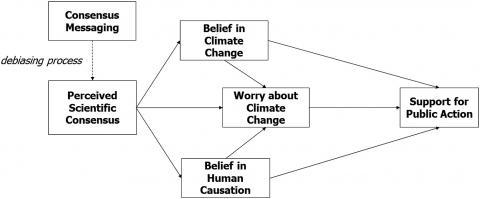The Gateway Belief Model (van der Linden et al., 2015; 2019) is a dual-process theory of attitude change. The model is premised on the principle that perceived (scientific) consensus is a central belief within a larger network of cognitive and affective judgments about contested issues. Because people frequently misperceive group-consensus, perceptions of the consensus can be 'debiased' by conveying descriptive norms (e.g., "97% of scientists have concluded that climate change is happening"). The model features a two-stage mediational process where the first stage is the main effect on perceived scientific consensus and the second stage includes downstream direct and indirect effects on private attitudes and policy-support (van der Linden, 2021).

It is important to note that in the model, the variables represent pre-post difference scores (belief updating) conditional on experimental assignment (these paths are not always displayed to reduce visual complexity). So a pre-post change (treatment vs. control) in perceived scientific consensus is expected to lead to subsequent (smaller) changes in private attitudes which in turn predict changes in support for public action.
The GBM has been extensively applied in the context of climate change but also in other contexts, including vaccine hesitancy, GMO's, and Brexit. We are currently interested in applying the GBM in new domains, examining the role of ideology and other moderators, field experiments using the GBM, as well as novel longitudinal studes.
If you'd like to learn more, feel free to read our SPSP blog.
For a list of publications by topic, please see the list below:
Main GBM studies
Climate Change
- van der Linden, S. L., Leiserowitz, A. A., Feinberg, G. D., & Maibach, E. W. (2015). The scientific consensus on climate change as a gateway belief: Experimental evidence. PloS ONE, 10(2), e0118489. --> Replication Data
- van der Linden, S., Leiserowitz, A., & Maibach, E. (2019). The Gateway Belief Model: A Large-Scale Replication. Journal of Environmental Psychology, 62, 49-58. --> Replication Data
COVID-19 and Vaccines
-
Kerr, J., & van der Linden, S. (2021). Communicating expert consensus increases personal support for COVID-19 mitigation policies. Journal of Applied Social Psychology.
-
van der Linden, S., Clarke, C., & Maibach, E. (2015). Highlighting consensus among medical scientists increases public support for vaccines: Evidence from a randomized experiment. BMC Public Health, 15(1), 1207.
Reviews
- van der Linden, S. (2021). The Gateway Belief Model (GBM): A Review and Research Agenda for Communicating the Scientific Consensus on Climate Change. Current Opinion in Psychology 42, 7-12.
Motivated Reasoning and Reactance
- van der Linden, S., Leiserowitz, A., & Maibach, E. (2018). Scientific agreement can neutralize the politicization of facts. Nature Human Behaviour 2, 2-3. doi: 10.1038/s41562-017-0259-2.
- van der Linden, S., Maibach, E., & Leiserowitz, A. (2019). Exposure to scientific consensus does not cause psychological reactance. Environmental Communication.
- van der Linden, S., Cook, J., Maertens, R., Goldberg, M. H., Kerr, J. R., Lewandowsky, S., … Leiserowitz, A. (2021). Do Climate Change Consensus Messages Cause Reactance? A Comment on Chinn and Hart (2021). https://doi.org/10.31234/osf.io/kqsfz
The Role of Social Consensus
- Goldberg, M., van der Linden, S., Maibach, E., & Leiserowitz, A. (2019). Discussing global warming leads to greater acceptance of climate science. Proceedings of the National Academy of Sciences 116(30), 14804-14805.
Longitudinal studies and effects over time
-
Maertens, R., Anseel, F., & van der Linden, S. (2020). Comatting climate change misinformation: Evidence for longevity of inoculation and consensus messaging effects. Journal of Environmental Psychology, 70, 101455.
---> Replication Data
- van der Linden, S., Leiserowitz, A., & Maibach, E. (2018). Perceptions of scientific consensus predict later beliefs about the reality of climate change using cross-lagged panel analysis. Journal of Environmental Psychology, 60, 110-111.
Geography and Spatial Variation in Consensus Beliefs
- Zhang, B., van der Linden, S., Mildenberger, M., Marlon, J., Howe, P., & Leiserowitz, A. (2018). Experimental effects of climate messages vary geographically. Nature Climate Change 8, 370-374.
How to communicate the scientific consensus
- Goldberg, M., van der Linden, S., Ballew, M., Rosenthal, S., Gustafson, A., & Leiserowitz, A. (2019). The experience of consensus: Video as an effective medium to communicate scientific agreement on climate change. Science Communication 41(5), 659-673
- van der Linden, S., Leiserowitz, A., Feinberg, G., & Maibach, E. (2014). How to communicate the scientific consensus on climate change: Plain facts, pie charts or metaphors? Climatic Change, 126(1-2), 255-262.
Anchoring Effects and Other Critiques
- Goldberg, M., van der Linden, S., Ballew, M., Rosenthal, S., & Leiserowitz, A. (2019). The role of anchoring in judgments about expert consensus. Journal of Applied Social Psychology 49(3), 192-200.
-
van der Linden, S., Maibach, E., Cook, J., Leiserowitz, A., Ranney, M., Lewandowsky, S., Arvai, J., & Weber, E.U. (2017). Culture vs. Cognition is a False Dilemma. Nature Climate Change 7, 457-457.
- van der Linden, S., Leiserowitz, A., & Maibach, E. (2018). Gateway Illusion or Cultural Cognition Confusion? Journal of Science Communication 16 (05), A04.
For a complete overview of all existing research (> 40 papers) on the GBM, please visit John Cook's excellent blog on the GBM consensus as well as this meta-analyis which found an average effect of consensus on climate attitudes (g = 0.09) and this pre-registered meta-analysis in Psychological Science which has reported an average effect of g = 0.55 on perceived consensus and g = 0.12 on personal attitudes across domains.
